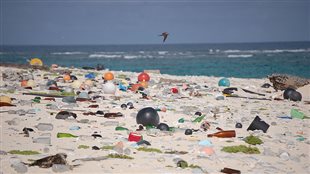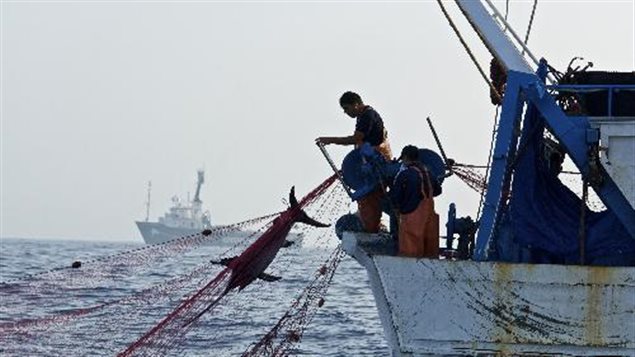The health of the world’s ocean is in a dangerous decline and we have five years to do something about it, says an independent commission made up of former heads of state and international organizations. After 18 months of investigation the Global Ocean Commission says the world needs to come up with an integrated rescue package to save the seas.
Listen“That body which produces 50 per cent of the oxygen that you and I breathe is in trouble,” says Paul Martin, one of the commissioners and a former prime minister of Canada. “The situation is worrisome and, because 45 per cent of the earth’s surface is totally ungoverned, except for a slight part with the Law of the Sea, right now we have no means of dealing with this.”

‘A healthy ocean is key to our wellbeing’
Besides providing half the world’s oxygen, the ocean fixes one-quarter of global carbon emissions, and the food chain starts there, points out commission co-chair Jose Maria Figueres. “A healthy ocean is key to our wellbeing and we need to reverse its degradation! Unless we turn the tide on ocean decline within five years, the international community should consider turning the high seas into an off-limits regeneration zone until its condition is restored,” he says.
Multiple threats
The threats to the oceans include overfishing, pollution, oil and gas drilling and mining. The commission calls for government subsidies for high seas fishing to be immediately capped and eliminated within five years. It notes that the top ten fishing countries are taking the value out of the world’s oceans even though it’s supposed to be owned by all world citizens.
The commissioners call for a stop to plastics pollution. They want legally binding standards for oil and gas extraction, the creation of protected areas where industrial fishing would be banned and a stop to unregulated fishing.

‘Canada (should) take the lead’
Canada has the largest coastline in the world including jurisdiction over sensitive arctic waters, says Martin, “and Canada, with that long coastline, has a responsibility globally, internationally to take the lead and I believe we should do it, and do it through the G20 which, after all, was a Canadian initiative.”
Martin would like ocean recovery to become one the United Nations sustainable-development goals which are now under consideration. He adds the Law of the Sea needs to be changed and an international monitoring body should be created to give regular updates on what countries are doing to help oceans recover.
‘My biggest worry is it’ll be too late’
Countries may balk at implementing the commission’s recommendations but he thinks they will eventually comply. “It is going to be a tough sell, but inevitably, no matter where you live, you breathe oxygen and the ocean produces 50 per cent of it and so I believe that the world is going to see that it has to act. I’m convinced that will happen. The biggest worry is (that) it’ll be too late.” The situation, Martin says, is very urgent.







For reasons beyond our control, and for an undetermined period of time, our comment section is now closed. However, our social networks remain open to your contributions.